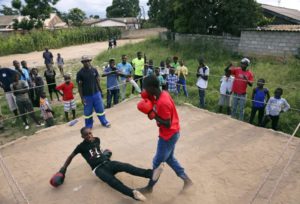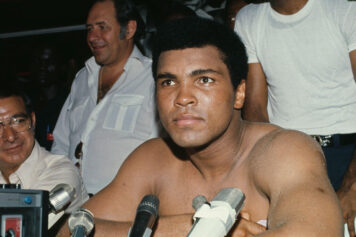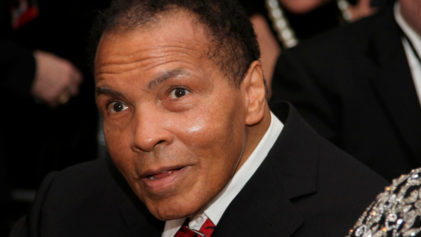
A boxing match in Chitungwiza, Zimbabwe. (AP Photo/Tsvangirayi Mukwazhi)
CHITUNGWIZA, Zimbabwe (AP) — Zimbabwean boys as young as 10 hurry every weekend to a boxing ring whose nickname Wafa Wafa in the local Shona language suggests that whoever enters will be lucky to come out alive.
No one has died in the ring, let alone suffered serious injury. But, the exchanges can be brutal and bleeding is part of the game in this impoverished township 18 miles outside the capital, Harare.
In Zimbabwe, where unemployment is rife and many youths are taking to drugs and alcohol, a former boxing champion hopes the pain in the makeshift ring will make for some gains.
“We are teaching them discipline through boxing. They are less prone to do drugs once they are committed to this regime,” said Arigoma Chiponda, a former light heavyweight local champion who now runs a gym and encourages youths to take up boxing, even though the prospects of going professional are slim.
The floor of the ring is muddied from recent rains, the ropes supported by unprotected metal poles. Most boys go into the ring barefoot. They wear anything from old jeans and T-shirts to shorts. One fighter goes into the ring with formal trousers, shirt and shoes, looking like he’s come from a wedding.
There are two pairs of frayed gloves which the young fighters use to pummel each other. They are one-size-fits-all, so they are sometimes comically oversized for the youngest fighters.
Often there are bloodied noses and tempers flare over “unprofessional conduct” when blows go below the belt.
Nearby is a shopping center teeming with beer drinkers. Other youths pass around a prescription cough syrup sold on the black market to get high. Groups of numbed youths sit like zombies there and at nearby street corners.
“I stopped being part of that crowd when I started boxing,” said Abel Chitsoka, 17, pointing at some teens his age gulping the cough syrup nearby.
“The ring is free for all. It helps keep the kids focused, but, eventually, we would want them to go professional. Unfortunately, the sport is not viable in Zimbabwe right now. There are no sponsors and it has been years since we had professional tournaments,” said Gilbert Munetsi, a regular at the fight club and a former secretary-general of the Zimbabwe Boxing Control Body. “We are thinking of taking them to Namibia.”
Kudzai Chimwaya is 10 but throws and dodges punches like a mini-professional.
“I have been coming here for two years now,” he said. “I want the bigger boys now.”
Coaches milling around won’t allow it because the rule is to pair boys of the same age group to avoid serious injuries.
“Our challenge has been convincing their parents that this is a safe sport,” said one coach, Pamson Sankulani. “The lack of proper equipment and medical kits is something that always unnerves the parents.”
They don’t have such issues with Omega Chimwaya, Kudzai’s father. He is usually among the ringside spectators watching his son in action.
“He loves it, so I let him do it. I fear I will lose him to the drug and alcohol gang if he doesn’t grow up boxing,” Chimwaya said. He added that he hopes his son won’t think of taking the sport too seriously as he grows up.
“No way. Boxing doesn’t pay in this country. He should do school and become someone in life. He has to finish his weekend school homework before he ventures out here,” the father said. “Yes, it’s a good place to keep the kids from the wrong influences. As a career, no.”

